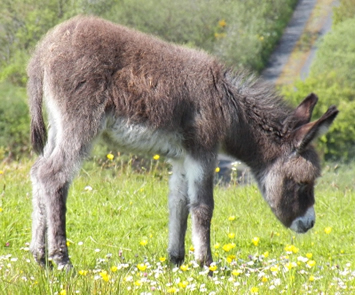Newsletter Spring 2014
FUNDING FROM THE DEPARTMENT OF AGRICULTURE FOR VOUCHER ASSISTED GELDING OPERATIONS
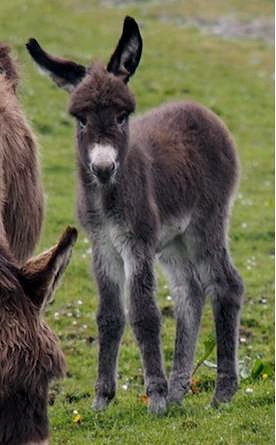
Cute as they are breeding more
foals is irresponsible
Just before Christmas 2013 we received the amazing news that the Department of Agriculture, Food and the Marine, had backed our request for funding an initiative to help owners of stallion donkeys, ponies and horses get their animals gelded, microchipped and passported.
Both the gelding and the registration process are quite expensive for people on limited and strained budgets, and in some cases there is little understanding of how the process works or how to go about it, so we decided to roll out a ‘pilot’ assisted voucher scheme which allows up to €120 towards the costs incurred for a donkey or mule/jennet and €100 for a pony or horse.
Donkeys require full anaesthesia and usually require a heavier dose of anaesthetic, hence the extra.
This sum would be flexible in both directions depending on individual circumstances.
All animals to be gelded would have to be microchipped and passported already, or agree to the process at the time of gelding; the vet carrying out the procedure will be familiar with the Scheme and between them and the Sanctuary we will assist with the application forms and other paperwork which many people find so daunting.
With a funding of €12,600 of which we have already used €1,600 for the gelding of abandoned donkeys, we should be able significantly to reduce the number of unwanted stallions in the area and consequently the number of unwanted foals, render the stallions more manageable and therefore more valuable and more easily rehomable and impact on the number of abandoned equines and welfare situations.
We have long held to the opinion that culling animals is a short-term and unsatisfactory solution: if we are ever to recover from the current and internationally documented equine crisis in Ireland, there absolutely must be strict breeding controls and enforcement. Happily the Department of Agriculture is also working along these lines and we expect to see much tighter legislation on breeding and responsibility of ownership through registration within the next months.
Anyone in Co Sligo,or borders of Co. Leitrim, or Co. Roscommon wishing to avail of this assisted voucher scheme should contact us on sai.donkeys@gmail.com or tel: 0861031932 for further information. HungryHorseOutside, which is based in Co. Longford, secured a similar sum for the same purpose from Lush Cosmetics UK so between us we are able to assist in a good sized area. We regret we cannot extend further at this point, though it is hoped that other organisations will follow suit in due course.
NEWCOMERS
Where last winter and most of the summer the welfare emphasis was on stallions, this is shifting to include mares, mares in foal, mares with foals and even more sadly, tiny foals which have been found abandoned in fields, on the road, in forestry and on bogland. Generally the foals are colts, though not exclusively – a very sad reflection on society that a very young animal, with all its vulnerabilities, should be considered so valueless (at all levels) as to be discarded as a waste product.
Amongst our newcomers we welcomed donkeys Arabella, Lawrence, Claire and MoMo, Poppy Rose, Penny, Brandon and Brefni, and a stunning 12hh Welsh pony called Jeannie and four mini Shetland ponies, Foggy with her foal Hazy and Amber with her foal Topaz.
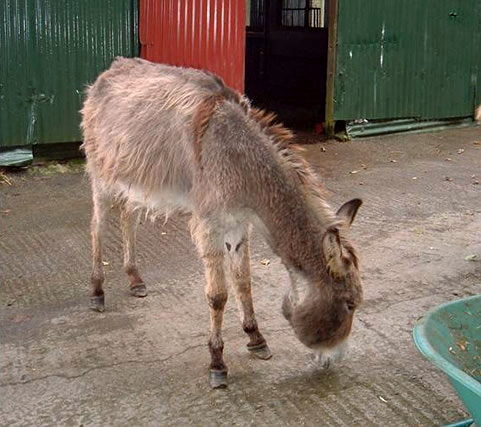
ARABELLA was abandoned on an old building tip in Ballahaderreen, Co. Roscommon along with eight stallion donkeys. She is a tall, fine mare and with no reserves was seriously emaciated, in part because the stallions were constantly harassing her giving her no peace to eat what little she may have found.
The ISPCA was called to the situation and subsequently asked us to take Arabella into care as a welfare case: the stallions were in better condition but in the absence of an owner they were classed as abandoned but I understand they were moved before they were seized, possibly to turn up in another welfare situation (see later)
Arabella is a sweet natured mare who, probably because they both needed extra feeding, has befriended MillyMatilda. They spend their days in close knit companionship rather like two elderly spinsters in rural seclusion. We hope Arabella is not in foal – so far she shows no sign of being so.
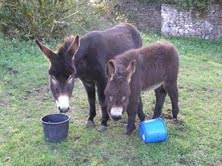
CLAIRE and MoMo
Claire is a dark brown mare who arrived unannounced at the farm of friends who have already fostered two elderly ponies from us. She was protecting her colt foal of about 5 months, who was extremely timid and remains reserved even now.
Claire herself soon worked out that she was in a good place and charmed her way into the hearts of her benefactors so they decided to keep the pair of them as long as we were able to meet the bigger costs of gelding the foal, MOMO, when he is old enough, and microchipping and passporting.
As it turned out Claire is already microchipped but the owner to whom she was registered denied all knowledge of ever having owned her, and at this time there was no legislation in place to enforce responsibility. Hence the expense of verifying the microchip number through our vet, acquiring a duplicate passport and a change of ownership all had to borne by the Sanctuary – a complete nonsense when this process cost more than the original chip/mark-up and passport! The main thing is, however, that the two donkeys have a wonderful safe home thanks to this lovely couple.
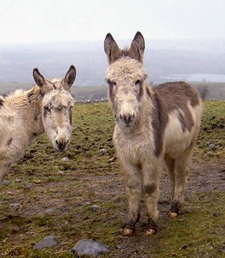
POPPY ROSE
Poppy Rose came to us from HungryHorseOutside as a yearling filly found abandoned with five stallion donkeys and as with Arabella, we hope she is not in foal.
She is far too young to be foaling and, as delightful as they are, more donkeys are not required just now! She does seem rounded in all the wrong places though, so we have our doubts . . .
BRANDON

Brandon was about 6 months old when found abandoned in a field with a 17.2hh hunter gelding. Fortunately the gelding was a very quiet horse as Brandon was so young he was still trying to suckle to the absolute consternation of them both!
He’s a quiet, reserved little fellow who keeps himself pretty much to himself but is quite capable of holding his own amongst the bigger donkeys when the occasion demands. Initially timid of people he is growing in confidence slowly but surely.
BREFNI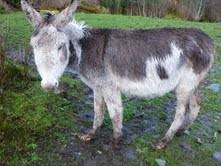
Brefni is an older skewbald mare also found abandoned in forestry near Dromahair, Co. Leitrim. It is understood that she was with other donkeys who were rounded up and moved when a neighbour complained about their deteriorating condition.
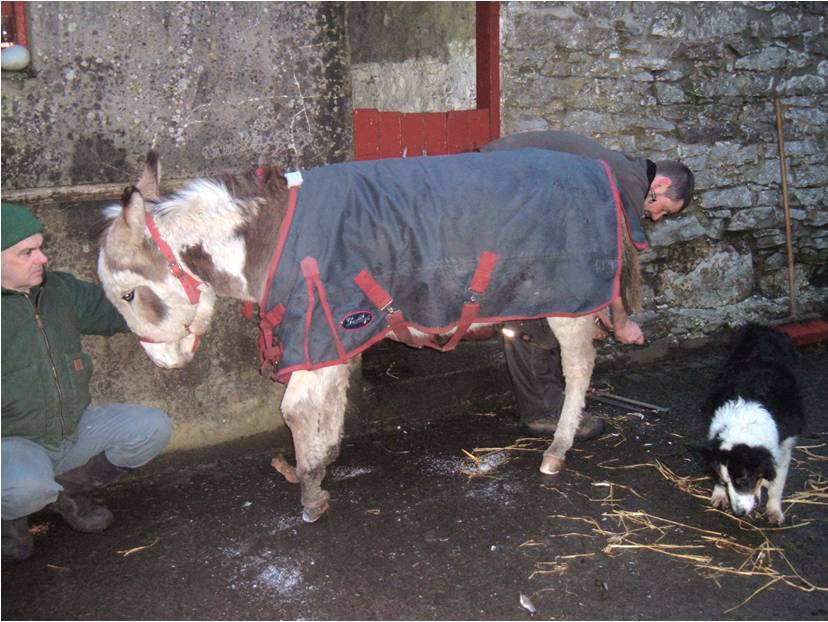
Brefni was undernourished when found and had extremely overlong hooves, so chances are she was left behind either because she couldn’t run to keep up with the other donkeys, or simply, because of her condition, she was considered worthless.
Whatever the reason we are delighted to know she is safe now: she’s quiet and easily handled so was probably someone’s much loved pet at some stage in her life.
JEANNIE
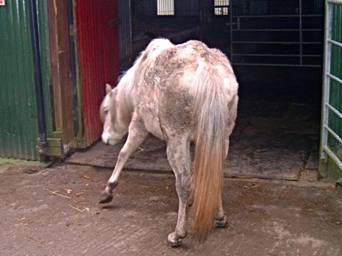
Jeannie was saved literally in the nick of time.
Two other ponies with her had already died of a combination of starvation and impacted colic and but for the intervention of a neighbour Jeannie may have travelled the same road.
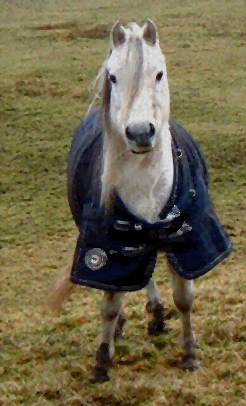
Left: Jeannie on arrival, barely able to stand.
Right: Jeannie on the road to recovery
She was swaying on her feet, ready to go down, by the time we brought her to Sanctuary, painfully weak ,thin and dehydrated.
She is a very pretty grey Welsh section 'A' pony of 11 years and is known to have been riding prior to being so neglected.
As she too was exposed to stallions we intend to keep her close until it can be confirmed one way or another whether she also may be in foal.
She needs work on her teeth before she could be ridden again but for now she is just regaining her strength and confidence. For such a beautiful pony she has remarkably low self esteem!
FOUR SHETLAND MINIS
The four Shetland minis, FOGGY, HAZY, AMBER AND TOPAZ all arrived together as unwanted little girls of varying ages.
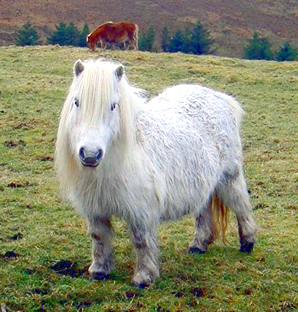
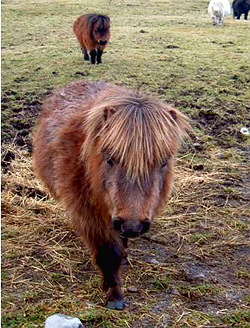
Foggy is quite elderly, Amber middle-aged and the the two foals now around 18months.
They are a delightful and very bonded foursome, full of mischief and personality so great entertainment value.
In a perfect world they should be rehomed together. . . if you have the space and lots of love to give please get in touch.
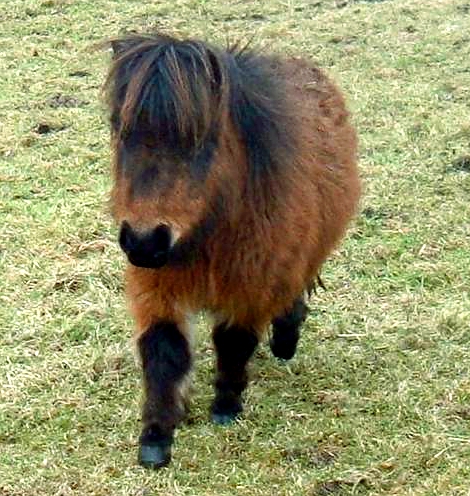

Top:Foggy and Hazy
Bottom: Topaz and Amber
LAWRENCE AND PENNY
Lawrence (left) and Penny (right) came in separately through different circumstances. Neither have been in any way neglected. Lawrence’s owner is awaiting a hip replacement operation and just couldn’t manage a boisterous and characterful 8 year old donkey gelding until she is completely confident on her feet again so we agreed to look after him meanwhile.


Two year old Penny was left alone when her young family moved to a different house and her pony companion was sold on. Her owners were most concerned that she should not end up at a Mart or in a dealer’s yard as she is an exceptionally gentle and affectionate young donkey. When times improve for donkeys in general we hope to find a loving home for Penny and a friend in the locality.
DUCHESS GOES TRAVELLING
Many of you have been following the progress of the beautiful cob Duchess who was originally rescued by HungryHorseOutside but spent time here before being fostered for several months with two other cobs.
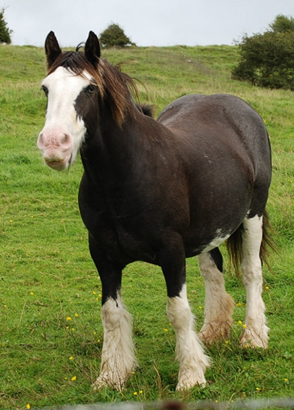
She was returned to us last Spring and spent the summer chilling out with the bigger horses where she matured into a truly beautiful girl.
Early in the winter she returned to HHO to continue her training, during which time she made a very close friend of another cob called Charlie.
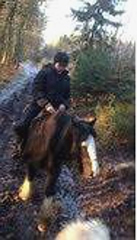
Because of their size, strength and most of all their lovely temperaments, Duchess and Charlie were selected to travel to Brussels where they are being trained in the natural horsemanship method, for holiday trail riding in the forestry.
Their new keeper, Dirk, a German man with many years experience with horses, keeps us regularly informed of their progress with loads of photographs and there is a standing invitation to visit them any time. From what we have seen so far the horses are thriving and really enjoying their new life.
Left: Duchess last June
Right: Duchess in her new role
TORRO AND INTI ARRIVE
Mid February we accepted two little jack donkey foals into care. Torro and Inti are both dark brown. Torro is the larger of the two at around 12 months old; Inti is still very foal -like, similar in size and maturity as Brandon.
Below: Inti and Torro just after arriving. Note Torro’s denuded spine and the scabbing on Inty’s ears from eccessive exposure to wet weather
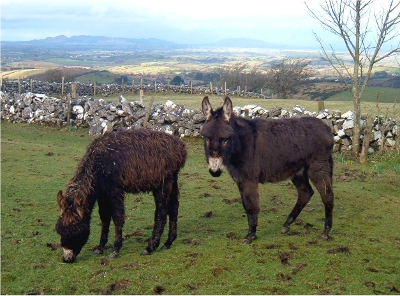 The wee guys were found abandoned in forestry and taken in by a local man in Monasteraden, Co. Sligo, who keeps a few donkeys and ponies of his own and couldn’t bear to see them looking so unkempt and sad.
The wee guys were found abandoned in forestry and taken in by a local man in Monasteraden, Co. Sligo, who keeps a few donkeys and ponies of his own and couldn’t bear to see them looking so unkempt and sad.
Although not emaciated both are underweight and show all the rain scald signs of having been living in wet, boggy conditions without shelter for the winter.
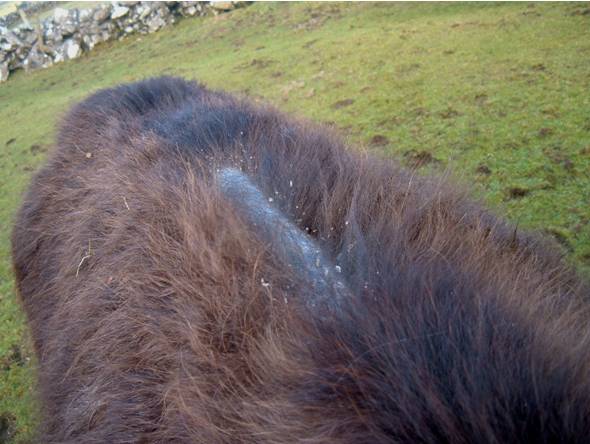
Torro has lost the hair off his spine and Inti has bad rain scald around the face, especially the ears and muzzle.
Both have ‘ankle socks’ where the constant wet has chapped the skin around their pasterns with subsequent hair loss.
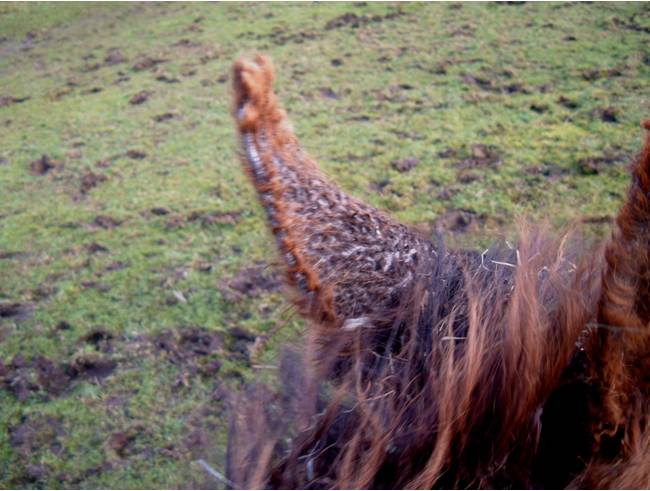
Thanks to their benefactor who brought them inside where they have had a good chance to dry out during the last week or two, the sores have healed and do not appear to be infected.
They were delighted to see other donkeys when they arrived but will be kept separately while they are dosed for parasites and checked over. They can see the other donkeys and once ‘clean’ will be able to meet through a fence and gateway, after which they will be slowly integrated with the other foals and mares. They are a delightful friendly pair whom we hope will make wonderful family pets in due course.
THE CRUEL REALITY OF THE EQUINE CRISIS
On 2 February we joined forces with HungryHorseOutside to round up and bring in nine ponies and 3 donkey stallions from a site in Ballahadereen, Co. Roscommon. The situation had been reported by two local women who had been monitoring the animals for some weeks; the suspected owner was well known to us as he has been involved in previous cases of animal neglect and cruelty and has, in fact, been prosecuted and banned from keeping equines before.
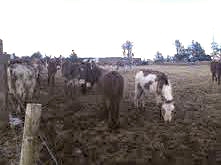
What awaited us was truly shocking: two horse skeletons, one horse carcass, one foal carcass and two donkey carcasses, plus the above animals, many of which were in atrocious condition and two of which were very seriously emaciated.
Right: Some more of his unfortunate donkeys, photographed 2013.
As HHO operates as the Roscommon Horse Pound with powers of seizure it was to their facility that all the animals were transported. Six of the ponies were to be transported by a local volunteer and sadly one of the bigger cob mares collapsed in the lorry so was in a very sorry state on arrival.
For several days she had to be winched onto her feet until she gained sufficient strength to go it alone yet throughout her ordeal she remained bright-eyed and optimistic. At only two years old we all thought she deserved the best chance and it is a credit to all at HHO that she improved sufficiently to be transferred to the intensive care of the ISPCA where she will receive ongoing veterinary treatment until completely recovered.
Five of the ponies were microchipped and registered to a 23 year old previous offender, banned from keeping equines, but whom we believe may be the ‘owner’ (registered or otherwise) of many more donkeys and ponies. Although we could never be certain we suspect Arabella also ‘belonged’ to him and that the three donkey stallions may be three of the eight that went missing on that previous case.
Two days later we were authorised to seize a small grey stallion pony that had been abandoned in partially flooded forestry nearby and which allegedly also belonged to this man. Although very wet and muddy the pony was in good body condition thanks to a neighbour gentleman who had fed him hay on a daily basis despite being threatened and warned not to feed him.
A local lady arrived with her small sheep trailer which could be detached from the car and pushed by hand down the long road leading to the forestry (there was absolutely nowhere available for turning a vehicle and trailer) and when we saw that the trailer had no ramp our hearts sank. The step up onto it was equally as high as the little fellow’s legs were long.! We seriously doubted he would jump into the trailer and small though he was no-one fancied having to lift him up but the wise little man saw a clean dry space with delicious smelling hay and popped in without hesitation. We couldn’t believe our luck! Who says animals don’t think!!!
This pony was taken into temporary care by some local people until there is space available in one of the overflowing rescue facilities – if they don’t fall in love meanwhile . . . (we hope )
A further stallion, also allegedly belonging to this man, was subsequently found out on the public highway and was collected by the Connacht Pound.
On all occasions we thank the Ballahaderreen Gardai for their help and support. We sincerely hope the ultimate outcome of this case will protect any further animals from being ‘owned’ by this person EVER!
Warning: The paper newsletter has a photo showing part of what was found in the field. This has not been added to this section of the online newsletter deliberately, as it is quite distressing, but can be seen if you double click the donkey.
EXPORTING OF UK’s WILD HILL PONIES
People 4 Ponies, Devon, UK, have for many years, been monitoring the sales and transport of the wild hill ponies, in particular the unregistered breeds like the Dartmoor ponies and some of the Welsh hill ponies. As we have witnessed these ponies being sold in large numbers through our local marts here, we combined our information with some enlightening, if disheartening results. Faye, founder of P4P has just completed an article on this subject from which I now quote:
“ It is now no secret – ponies were being transported abroad to Ireland and Europe.All ponies, whether registered (‘pure bred’ ponies) or unregistered (ponies such as Dartmoor Hill ponies with no pedigree), are supposed to be legally protected under the Minimum Value Legislation to prevent them from being exported from Britain to Ireland or Europe for slaughter.
For any pony under 14.2 hands high to be transported to Ireland or Europe for the purpose of breeding, riding, exhibition (showing/competition) or slaughter, they must have documentation, which includes proof of their value of £300 for a pony of between 12-14hh, £220 for a pony up to 12hh and £145 for Shetlands up to 10.2hh. An export licence is required and a fitness to travel or health certificate signed by a vet has to be included.
If unregistered ponies are being travelled to Europe then a Journey Log is also required which includes details of the transit and stopping areas so that legal journey times are not exceeded and a vet is supposed to check the animals on departure and on arrival – but any pony travelled has to meet the minimum value requirements.”
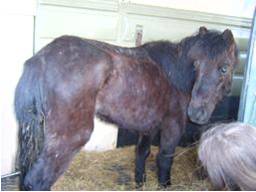
Left:Jetsie, one of the ponies we rescued from an Irish mart back in 2007
Our own investigations at the marts in the west of Ireland leave us in no doubt that for years these ponies were being exported illegally. Most arrived in lorries which drove down from Northern Ireland and on occasion when we tried to check the registration numbers of these lorries it was to find they were fake!
The ponies were usually exhausted, poor little things, many with unattended cuts and abrasions presumably incurred during travel. P4P goes on to say. . .
“It is not legal for wild ponies to be transported live abroad from Britain to Ireland or Europe – a Dartmoor Hill pony is usually sold for an average of £10 at the Dartmoor markets. The minimum value legislation requires value to be proved by a receipt of sale, insurance certificate, an invitation to compete or a certificate of valuation. These animals (and probably many hundreds, if not thousands over the years) have been travelled illegally without licenses or with any regard to their welfare.
It is now time that Defra admitted not only that this has been happening but also that there must have been weaknesses in the policing of the law. . . During our investigations we heard from several strong sources that the EU had been providing subsidies for horse meat but we have not been able to find this information in the public domain.
We couldn’t figure out how these dealers could be making enough money to profit from these ponies – particularly considering transport costs....and then, early in 2013, the horse meat scandal broke.
Autumn 2013 was the first time that NONE of these dealers were present at any of the wild pony markets (that’s why the sales were so low!). Why have they suddenly stopped? If any of these dealers were transporting to British equine abbatoirs (there’s one in Taunton about 55 miles away) why did none of them come this year – nothing has changed in that regard in terms of law??”
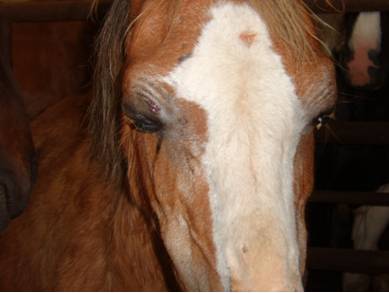
It appears Defra remains in denial, interpreting any lack of submitted paperwork to the Defra equine exports team such as health certificates or journey logs as proof that that no ponies left the country. Interestingly World Horse Welfare have also recently announced their findings that thousands of horses are being exported from Britain, including many bound for slaughterhouses, with no health or legal paperwork. Others are ending up at markets in Holland, Belgium and France that are used by meat buyers. So we suspect yet others may be travelling as far as Italy for both meat and skins. WHW points out that the UK is subject to laws governing the movement of animals across Europe and reports that ‘ unless there are good grounds, it prohibits routine checks at ports which would undermine the principles of free movement’ (The Sunday Telegraph February 2014).
It would appear this gaping conflict of interests not only allows but actively encourages illegal trade!
For People 4 Ponies full report please go to:
http://www.people4ponies.co.uk/liveexports.html
THE DONKEY
I saw a donkey one day old,
His head was too big for his neck to hold;
His legs were shaky and long and loose,
They rocked and staggered and weren't much use.
He tried to gambol and frisk a bit,
But he wasn't quite sure of the trick of it.
His queer little coat was soft and grey,
And curled at his neck in a lovely way.
His face was wistful and left no doubt
That he felt life needed some thinking about.
So he blundered around in venturesome quest,
And then lay flat on the ground to rest.
He looked so little and weak and slim,
I prayed the world might be good to him.
Anon

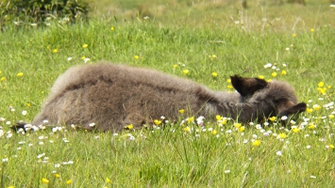
Megana last June
THANKS AS ALWAYS
To our fundraisers, volunteers, benefactors, supporters and helpers in a myriad of ways, we say yet another heartfelt ‘thank you’. We cannot overstate how much we both need and appreciate you!

Special thanks go to Diane Keevans who raised €480 for each of four local animal welfare organisations with a Jumble Sale - no mean effort and an awful lot of hard work.
To everyone who helped to sell our Christmas cards and 2014 Sai Calendars, in particular Inge Trotsaweicki.
To the very many of you who kept us going with both small and hefty monetary donations.
To the wonderful volunteers, Nina, Rebecca, Sandy, Sue from Wales, Deirdre, John from the USA who joined us for a second winter, this time for four months, as a resident 24/7 helper; Doris, who also joined us for a second long term volunteering session in February and is still working away. . .
Kean O’Hara who delivered six big round bales of fine quality haylage to the door just when it was most needed in February (the ‘hungry month’)
Mary Taheny and friend Kathleen for continuing with the Church collections whenever permits are available.
Eileen Carty and family for stamping all the newsletters twice yearly. . . the list goes on.
VERY special thanks go to John and Doris, who together with neighbours and colleagues Jurgen and family, plan to’ hold the fort’ for two weeks to let me have a holiday, something which has become a rare commodity during the overburdened years of Ireland’s equine crisis and which will be very, very, welcome!
WEBSITE HICCUP

Visitors to our website may have noticed a delay in the posting of our 2013 newsletters and other updates. This is because our webmistress’ laptop graphics card died unexpectedly and the poor woman has spent, quite literally, hundreds of hours retrieving the information for both our website and other peoples – a phenomenal and totally unenviable task for which we send our sympathy and huge gratitude.
To make matters worse her new laptop is an upgraded model with a different operating system which incorporates many changes over the old, familiar one! There is still work to do and of course she is often delayed because she relies on me to filter through the information and at times, with the overload of welfare calls, 70 equines in care and the many other daily distractions, I am not the best informer.

I can sympathise with the complexities of changing computers....having spent my entire computer ‘life’ working on a Macintosh with all its wonders, eccentricities, and sadly, incompatibilities, I am currently trying to learn PC talk and Windows 7, hence the new format of this newsletter. No doubt the result is simple by the standards of more expert computer users but believe me, I am just happy to get this one into print!! Please bear with me: I DO intend to improve!
We have also been asked on a few occasions recently why we don’t have an active Facebook page. The answer is simply TIME – or lack of it and frankly I would challenge any of the well wishers who believe us to be stuck in the Dark Ages, unable to live in the 21 st century, to get through the work we do on a consistent basis and still service a Facebook account regularly.
It should also be explained that much of our work is routine. As a Sanctuary rather than a rescue/rehoming centre we often assist in rescues but could be seen as claiming the kudos for the work of whichever charity instigated and organised the rescue if we were to report ‘their’ stories. Many of our intakes come through other charities who simply don’t have the time or facilities to look after the very damaged, traumatised or severely emaciated animals and these are the little ones you read about in these newsletters. Their stories are not usually dramatic, though thankfully most make quiet improvement over many weeks or months, sometimes even years and for us that is enough. Ed.
We believe fervently that
‘we can do no great things, only small things with great love’.

MORE FUNDRAISING NEWS
Whilst writing this I have just learned that a lovely lady from Dublin, and possibly a young man as well, are planning to make a parachute jump for us in order to raise funds. The lady also plans to join the ‘barefoot walk’ where people pledge to walk a mile in their bare feet (ouch!) and run the Marathon. As she says herself, she will be nothing but skin and bones by the time she has all behind her. A full report of all these events will follow in the next newsletter and meanwhile we wish thesewonderful bravehearts all safety and success. Ed.
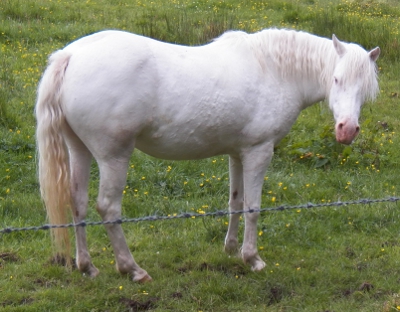
ALBINOS AND CREMELLOS
One of the welfare problems that returns to haunt us on a regular basis concerns ponies and occasional donkeys that are white in colour.
‘Albino ‘ is a term that is not strictly accurate in the horse world but is in usage, along with Cremello ( a more creamy white) Both lack pigmentation in the skin which is therefore pink and they usually have pale blue eyes.
Both are highly susceptible to skin problems – rain scald, mud fever and lice infestation in the wet, sunburn and eyesight difficulties in the sun and in our experience they seem to be more prone to ‘sweetitch’ (an allergy to midge bites) than many of their darker companions, though anyone with a black horse which suffers from this awful complaint will be quick to refute this!
They are also well known for their tendency to produce skin melanomas, especially around the eyes and genitals.
Many albino type ponies suffering from rain scald and mud fever have been brought to the attention of welfare organisations during this extremely wet winter. Whilst they may not look too dramatic, this condition is extremely sore for the animal though the real risk comes when the skin chaps and bleeds, as it is then open to bacterial infection, which once present, is difficult to eradicate.
For the sake of a waterproof rug, placed on the animal before it begins to get sore and lose hair , or provision of a shelter where he/she can get out of the constant rain to dry out, these poor creatures suffer for weeks, if not months and in some cases may be rendered un-rideable in the future.
In more profitable times these white and cremello coloured ponies were popular with some breeders as they believe they are inclined to produce a coloured foal (skewbald, piebald or otherwise marked), which in better years were popular sellers. Now it seems we are once again picking up the pieces of the equine crisis as we come across increasing numbers of these ponies abandoned, or at best, just left out without protection to get on with it as best they can. If you know of such a pony, horse or donkey , please provide them with shelter from the rain in winter and the sun and flies in summer (a UV fly mask will help).
All equine and asinine appreciate this but for the white ones it is imperative.
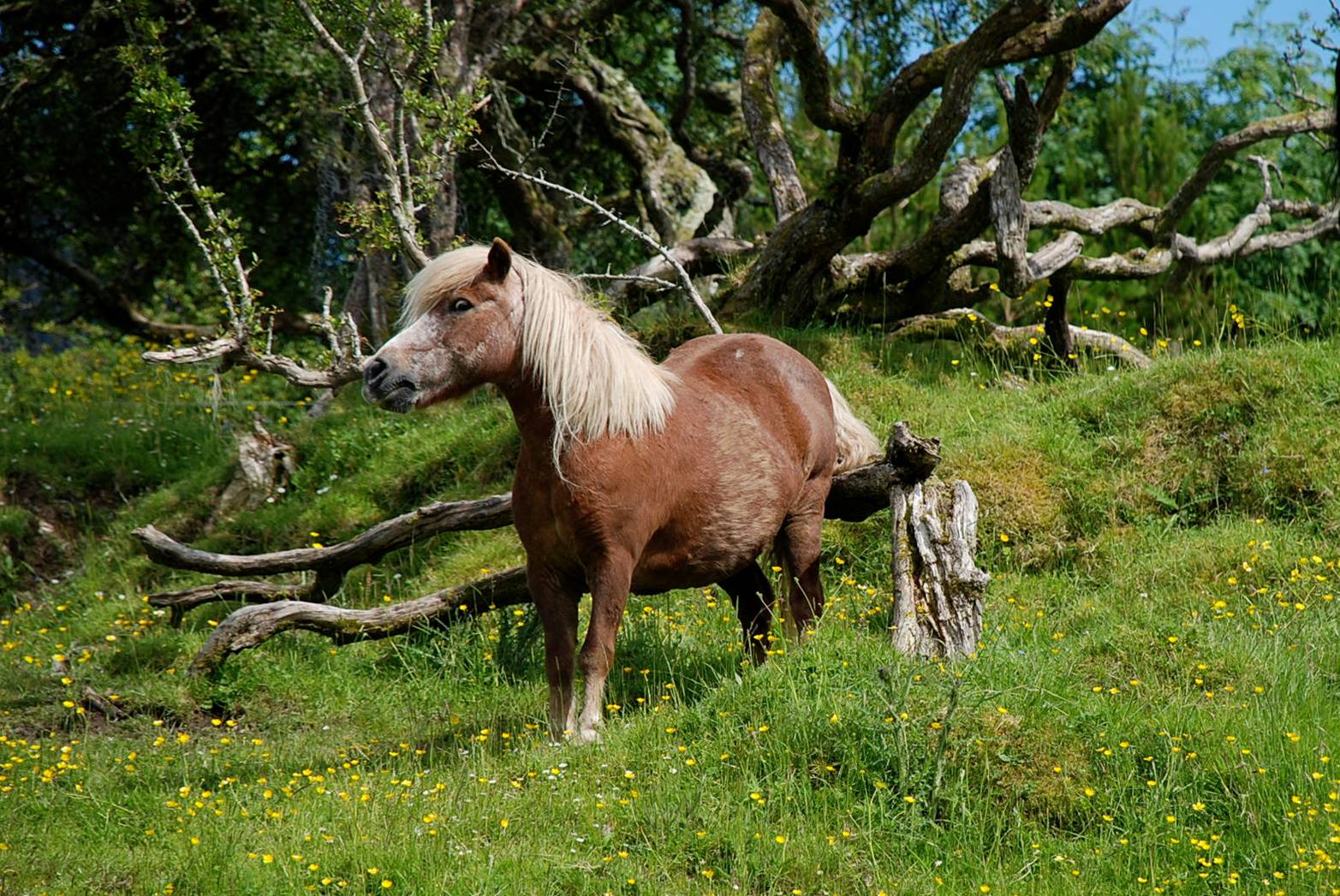
Come and meet the gang Saturdays, Sundays and bank Holiday Mondays 10am-4pm
And most other times by appointment.
Have a great summer!
